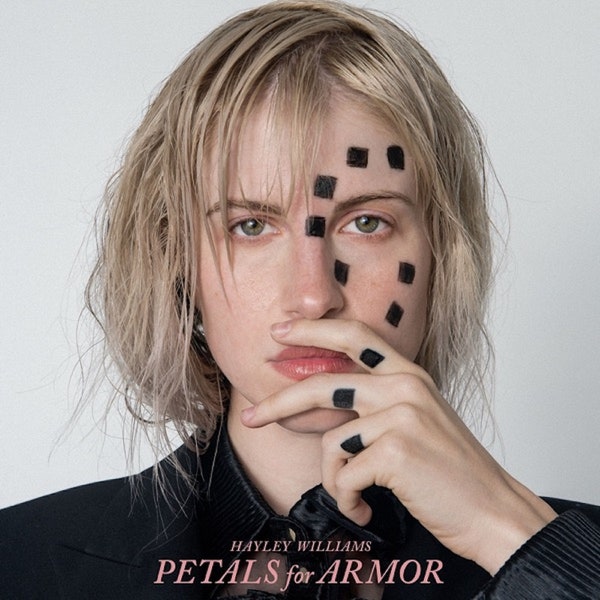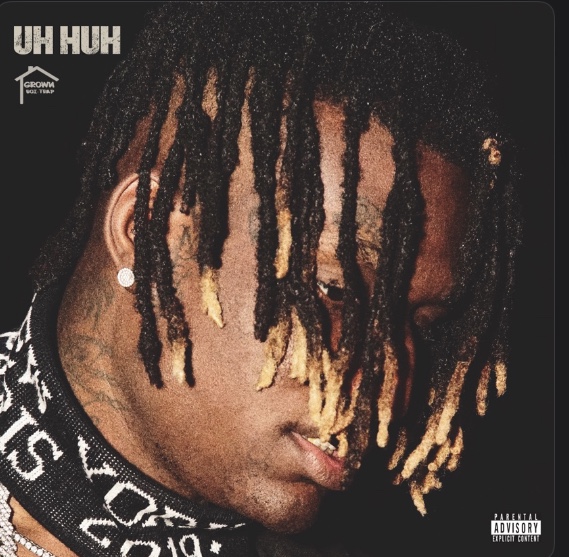By: Heather Bushman
Hayley Williams is a walking contradiction. She’s lonely in a crowd. She smiles when she cries. She has one of the biggest and most powerful voices in music but she stands only 5’2”. She puts some of her darkest lyrics over upbeat pop productions and some of her brightest in the middle of hardcore punk pieces. She rebuffed the opportunity for a solo career in favor of a band that, with her as the sole constant member and undeniable frontwoman of a turbulent rotating lineup, has the tendency to feel like her solo vehicle. It’s naïve to think that Williams hasn’t recognized the contradiction by now, even embraced it. If Paramore’s After Laughter, a record with some of the most sorrowful writing in recent memory working in tandem with the band’s glossiest instrumentals yet, doesn’t prove it, then Williams’s first official solo project, Petals For Armor, certainly does. Divided into three sections, two of which were released as EPs in February and April, the album chronicles Williams’s journey from a life of loss and loneliness to one of love and community
Before discussing the album thematically, something must be addressed. There is a cardinal sin in listening to Petals For Armor, one that is to be avoided at all costs: expecting Paramore. Do not expect Paramore. It will only bring disappointment, because this is decidedly not Paramore. The skeleton of Paramore is there, with Williams on lead vocals and production from lead guitarist Taylor York, but the sonic details are vastly different. Gone are the Riot!-era power chords and pounding backbeats, replaced here with distinctive bass lines, plucky synthesizers, and syncopated drum machine rhythms. It’s not necessarily better or worse than the angsty distortion of Brand New Eyes or the glittery guitar tones on After Laughter, but the instrumentals on Petals For Armor are smaller, more intimate. Sometimes, low piano chords and soft clicks build to bright bell-tone choruses like “Pure Love,” and other times, the light bass notes and easy backbeats are enough to carry songs like “Roses/Lotus/Violet/Iris,” but either way, Petals For Armor is a relatively quiet and subdued album. It’s certainly not the upfront instrumental work that we’ve come to associate with Williams, but it’s not supposed to be. Petals For Armor is a separate entity from any Paramore record, and while it’s tempting, even logical, to compare the two, the correlation is counterintuitive to the point of Williams doing solo work. This is her story and her style, entangled with but not identical to the story and style of the band. In order to fully understand and enjoy Petals For Armor, this fundamental truth must be understood:
It’s not Paramore. It’s Hayley Williams.
She’s written using inspiration from personal life since Paramore’s conception, but on Petals For Armor, it feels like Hayley Williams is opening up for the first time. The record is an intimate look inside the psyche of a woman searching for love in a life defined by loss. From her past bandmates, to her dementia-stricken grandmother, to her affair-turned-marriage-turned-divorce, no stone is left unturned. “If you know love, you best prepare to grieve,” she warns on “Leave It Alone.” It’s a harsh reality, one that prompts a somber question: is it better to love and lose or not love at all?
It’s this choice, love at the risk of loss, that dominates Petals For Armor. Loss is the heavier emphasis of the two throughout the first half, where Williams dissects the failures of her prior relationships and the scars they left. It’s the result of looking for love in the wrong places, accepting any expression of love no matter the cost. That cost is manifested as the mental drain of a lingering bad habit, Williams unable to stop “suckin’ on the memory of him” on “Creepin’” and giving into physical impulses despite emotional damages on “Sudden Desire.” If rage-fueled lead sing “Simmer” is anything to go by, Petals For Armor I, the first EP, is biting, scathing. If played as a standalone project, it prompts the assumption that Williams has sworn off all notions of closeness after the alarming track record she outlines.
In the latter half, Williams chooses love: healthy, reciprocal, fulfilling love. She celebrates a lifelong friendship on “My Friend,” completes an exercise in self-confidence on “Watch Me While I Bloom,” and embraces her new relationship status on “Taken.” As a staple of the pop-punk scene, the pressure to act masculine and unfeeling was ever-present, but here, Williams finds love in every facet of living. “Cinnamon,” though only the third track, is an early glimpse into the album’s positive turnaround, reveling in the comforts and familiarity of Williams’s home. On “Roses/Lotus/Violet/Iris,” she expresses a sense of belonging in her femininity and learns to embrace it. Overall, this back half adopts a much brighter point of view, one that feels entirely euphoric by album’s end. That’s not to say that Willams ignores the traumas that defined the bitter first half, but here, she’s learning instead of lamenting. “Sugar On The Rim,” with punching synthesizers and Williams in her lower register, references the past not as a liability but as a lesson, wondering “could you be the silver lining like sugar on the rim?” Williams now understands the value of love after living without it, and she’s a better partner, friend, companion, bandmate, and human being for knowing not to take love for granted.
It’s not a flawless album by any means. The low point, though not technically part of the album itself, was probably the odd release schedule. Of course, Disease Who Shall Not Be Named threw quite the wrench in the original release plans, Williams moving her tour dates back a year and distributing Petals For Armor II track-by-track instead of all at once as intended, but the original idea of releasing full EPs as the album leadup was an awkward endeavor. With 10 of the 15 tracks already out before the album’s official release, the anticipation and the impact of the drop was significantly dulled.
Petals For Armor has its internal errorsas well. Some of the instrumentals run dry with little to no build, and the powerful vocals for which Williams has become so well-known are almost absent. It’s not necessarily a bad choice to leave out the signature belts, especially when the album is much smaller than the traditional Paramore sound. A more subdued vocal performance is appropriate given the work’s more intimate nature, but given Williams’s virtually limitless vocal potential, it just feels like something is missing. Thematically, Petals For Armor can feel all-over-the-place. It’s an emotional pinball, jumping from enraged to empty to ecstatic in a matter of minutes. The guilt-ridden “Dead Horse” transitions directly into the sincere “My Friend,” and the instrumentals of each sound better suited for the other. It’s a realistic expression of the ever-changing state of the human mind, but in terms of album consistency, the switch-flips can feel disorienting.

So no, the album is not without its faults, but to err is to be human, isn’t it? And that’s what Petals For Armor is in every sense of the word: human. It’s clunky, sporadic, irate, indifferent, gritty, glistening, and everything in between, hitting the highest of highs and the lowest of lows in just under an hour. Every detail feels painfully personal, right down to the voice memo at the beginning of “Over Yet” where Williams apologizes for the delay in submitting the track. “I was in a depression,” she admits, “trying to come out of it now.”
Petals For Armor explores and embraces Williams’s life-changing emotional traumas so directly that listening to it feels like an invasion of privacy. With Williams, though, it comes across less like an invasion than an invitation. For someone who grew up in the spotlight, whose hard times and heartbreaks have been on display for the better part of two decades, maybe such public vulnerability was the most natural path to healing.
At the end of the day, Petals For Armor is Williams’s therapy, and it has clearly done its job. The entire press cycle for the album was centered on catharsis, with Williams raving in interview after interview about how freeing it felt to write and record surrounded by a community that encouraged her authenticity. She was open, honest, and insightful every time she sat down to talk about the album, and these interviews (especially with Apple Music’s Zane Lowe) give incredible context for a more fulfilling listening experience. It’s evident from this press, the statements Williams has released herself, and the actual work that the making of Petals For Armor was an eye-opening experience, one that definitively changed her for the better. “Crystal Clear,” the album’s closer, bridges the ideas of love and loss one last time, confirming the choice to love in a full-circle moment. Yes, loving with the possibility of losing is terrifying, but she is adamant that she “won’t give into the fear.” The choice of love is even seen in the album title itself. Petals For Armor represents the idea of using love as a strength, not a weakness, and fighting the fear of loss or personal failure with love’s protection. Hayley Williams, after years of loss, has finally let love in, and what a messy, painful, beautiful process it was to watch.
Rating: Give Her A Hug/10
Tracks To Save: “Simmer,” “Dead Horse,” “Pure Love”
Tracks To Skip: “Cinnamon,” “My Friend,” “Taken”
Follow Heather on Twitter to keep updated with new writeups, news, and endless wittiness!



